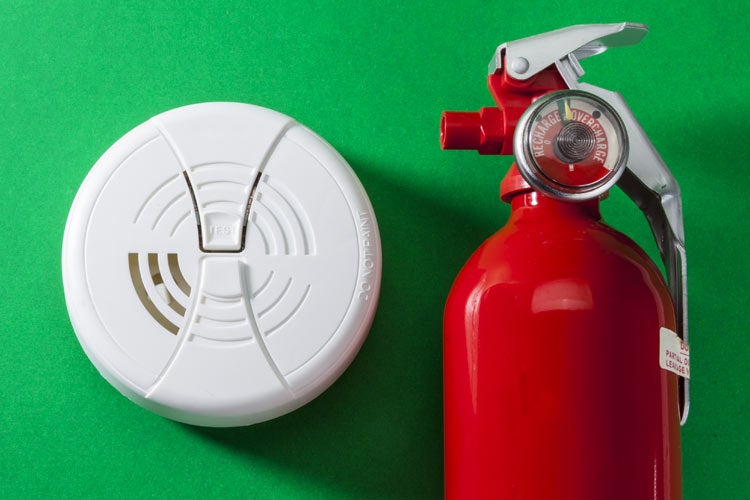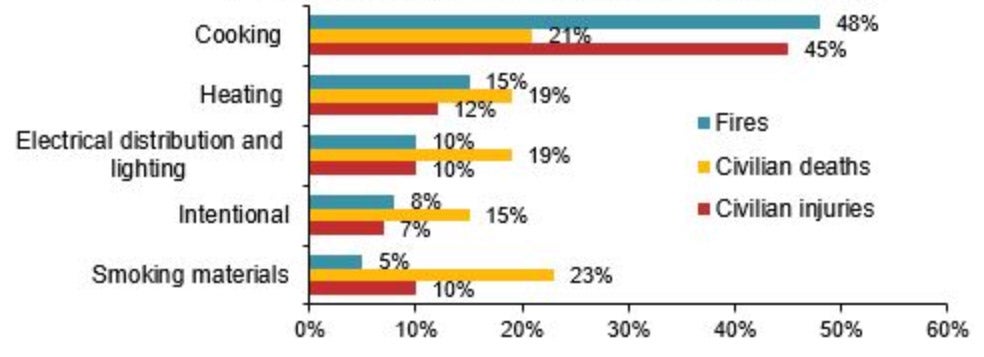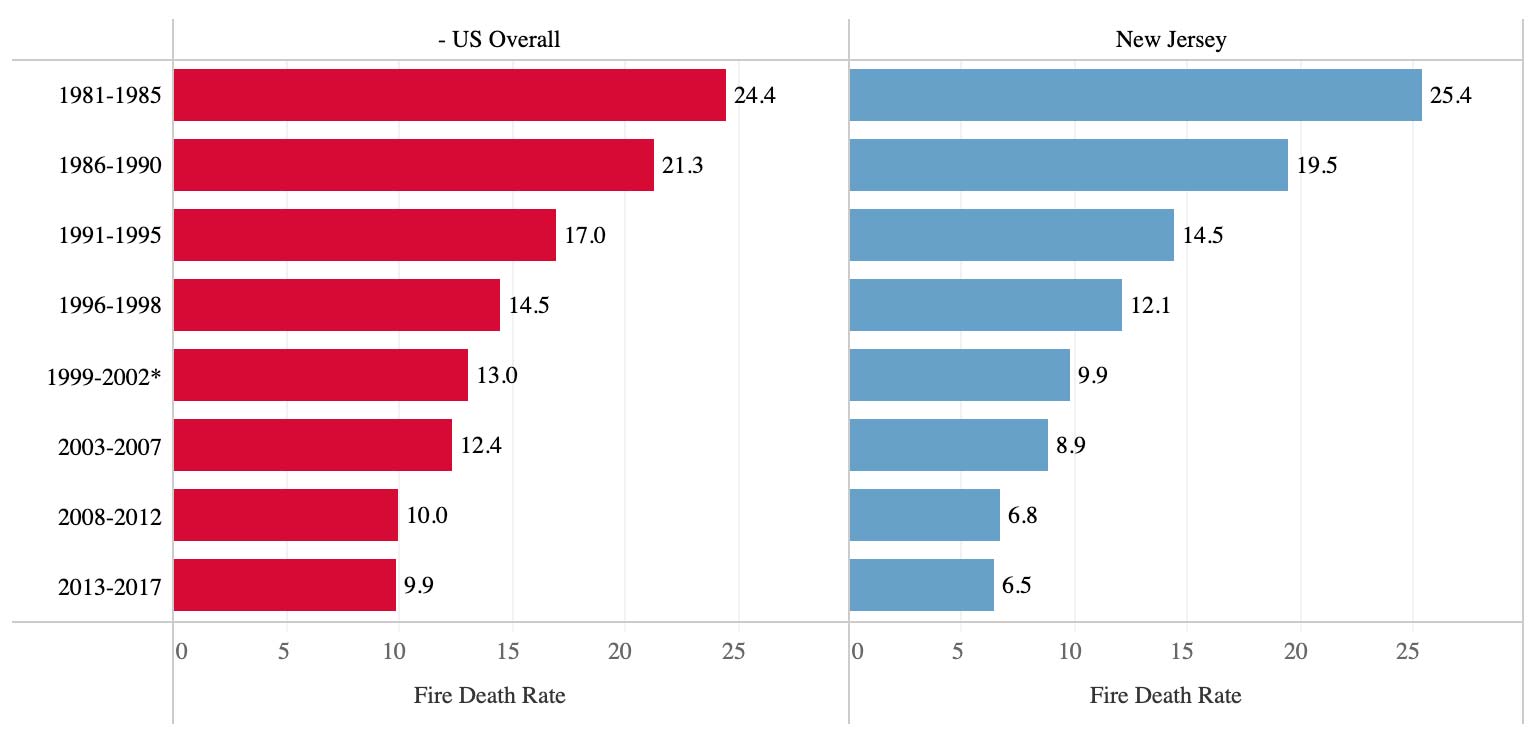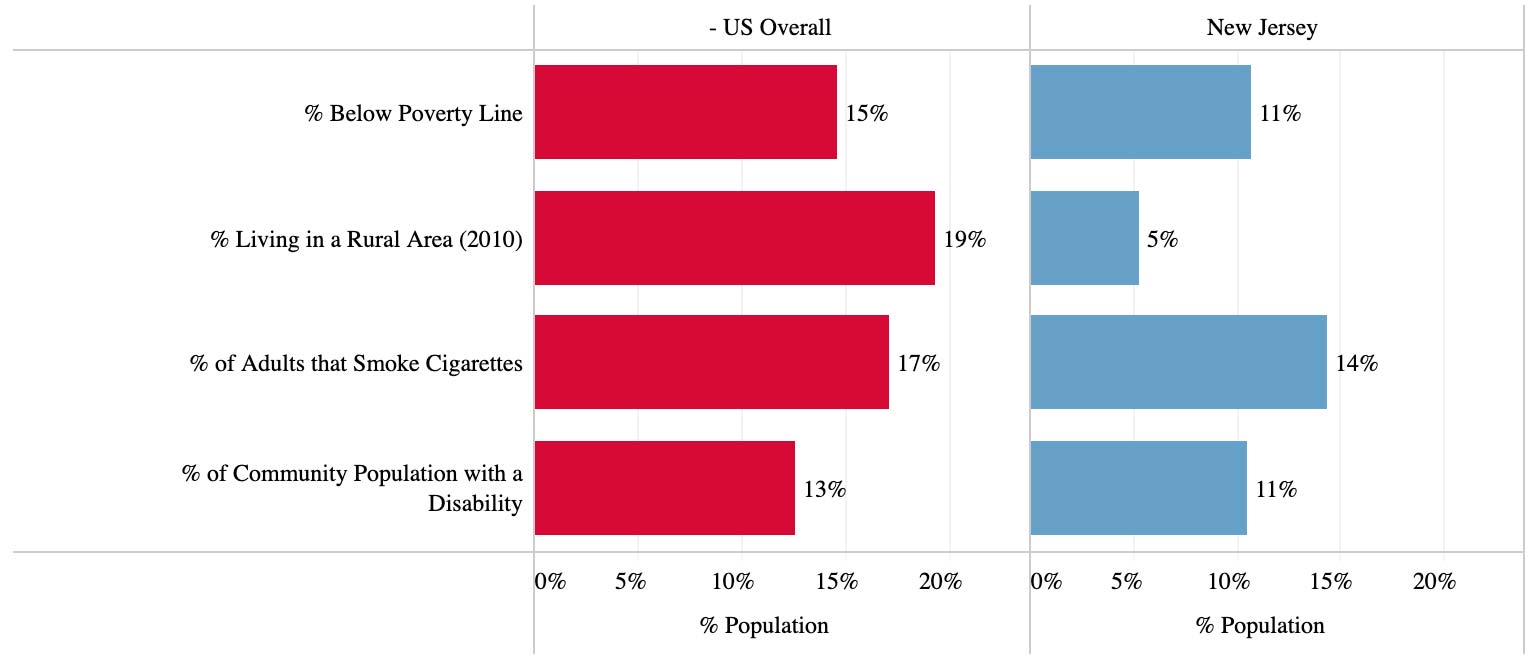
As a homeowner, you’re rightfully concerned about keeping your home safe from all potential disasters. Unfortunately, house fires are more common, costly, and deadly than many people tend to think. Between 2011 and 2015, US fire departments reported house fires had caused $7 billion in property damage and more than 2,500 deaths. Follow this guide of action steps to prevent house fires to help keep your home safe and cool.
Steps to Preventing House Fires in New Jersey
Leading causes of home structure fires: 2012-2016

While the bad news is that house fires are common, the good news is that in most cases they’re highly preventable. However, though some aspects of fire safety are common knowledge, others are less obvious. It’s important to be familiar with proactive steps to take to prevent house fires in all areas of the home, not just the glaring danger zone of the kitchen.
Take the following steps to prevent fires in your New Jersey home:
- Stay safe in the kitchen: If you’re in the process of any sort of cooking, keep a close eye on what you’re doing. Just leaving the room for a few seconds when a boiling pot is turned on can lead to a fire. If you have to leave the room, turn the stove off beforehand. Also be sure to wear close-fitting clothing when operating the stove and keep long hair pulled back.
- Stay safe when using other cooking equipment: Keep a safe perimeter of at least 10 feet around barbecue grills and never position them right next to the house or a railing. Never position the grill directly under a tree branch or operate the grill if there are fallen leaves on it. Keep woodstove pipes and chimneys clean and inspect them at least monthly for debris build up or other blockages. For the fireplace, install a heavy screen that can keep runaway logs inside. Make sure the screen fully covers the opening and efficiently catches loose sparks. Always put out fires before bedtime or leaving the house.
- Stay safe when using electronics: Don’t hesitate to replace or upgrade appliances with frayed or otherwise worn out electrical cords which can easily cause a fire. Keep cords in plain sight with plenty of air flow, and don’t run them under heavy rugs or carpeting. Make sure the plug easily reaches the outlet and the cord has a bit of slack to avoid tugging on the outlet. Immediately replace any outlets that feel hot to the touch.
- Stay safe when smoking: Smoking inside is still the number one cause of house fires. Only smoke outside and be sure to fully extinguish cigarettes, etc., when finished. Store the remains in an ashtray filled with sand, then soak them in water before transferring to the trash. Hot cigarette butts and ashes should never make contact with other trash. Never smoke in bed, smoke indoors while intoxicated or heavily medicated, or while otherwise drowsy/sleepy. Never smoke in a home with an oxygen tank.
- Stay safe with space heaters: Maintain a perimeter of at least three feet on all sides of portable space heaters when in use. Only purchase space heaters with a built-in safety mechanism to automatically shut off if it gets knocked over. Turn off space heaters when leaving the room, and unplug them when not in use.
- Stay safe with children: Declare a “kid-free zone” around all cooking areas, of at least a 3-foot perimeter. Inform kids at a young age about the dangers of fire and heating units and teach them proper fire safety procedures. Keep lighters, matches, and other fire-starting materials out of kids’ reach. Don’t allow children to supervise flame candles, stoves, or grills.
- Stay safe around the home’s perimeter: Clear combustible materials from your home’s surroundings on a routine basis. Keep trees and shrubs trimmed to a safe distance away from the home and keep lawns cut to a safe height. Only use portable generators outdoors.
The more proactive you are about preventing house fires in the first place, the better chance you’ll have at keeping your home, your family, and yourself safe from unnecessary disaster.
Start Preventing New Jersey House Fires Today
Aside from having general knowledge about how to prevent house fires, it’s perhaps even more important to know what action steps you can start taking today. There are certain tools you can buy and safe habits you can adopt right now to kick-start your action plan of keeping home fires at bay.
Start taking the following steps today to prevent New Jersey house fires:
- Install/check fire alarm systems: If your home already has a fire alarm system (and hopefully it does), that’s great. Take some time now to test each alarm to be sure the battery is still working and that the speaker is functional. It’s also a good idea to have both ionization and photoelectric smoke alarms or dual sensor smoke alarms. Check all batteries monthly and replace batteries annually. Make sure there’s a smoke alarm on every floor of the home including unfinished basements.
- Consider installing an automatic sprinkler system: If you feel your home is especially at risk of fire, you might want to install an automatic sprinkler system. You may want to install a sprinkler system if you live in a dry or heavily wooded area or an area that’s otherwise prone to wildfires as well.
- Update your home: If your home was built using highly flammable materials, consider updating to fire-resistant materials. You can update your windows to fire-resistant glass, use concrete for foundations and roofs, plaster walls with stucco to increase their fire-resistance, ensure that your walls have a gypsum sheath board (also known as drywall) behind them to help prevent the spread of fire, and otherwise construct the house out of brick which is the top fire-resistant material.
- Purchase and keep fire-fighting materials handy: If you’re serious about fire safety, it’s important to have some go-to materials ready to grab in the event flames do break out. Fire extinguishers and shovels are highly recommended items to have on hand to fight fires.
- Sleep with doors closed: To reduce your risk of being burned if a house fire begins and spreads while you’re asleep.
- Backup important documents: One of the most important (and often overlooked) proactive measures to take when it comes to house fires is backing up important documents electronically. Official personal identity records such as birth certificates and social security cards as well as tax records and other important information you need to hold onto should be stored both digitally and in print. Keep the printed copies in a fire-resistant case, like a safe.
- Prepare a fire-safety plan: If and when a fire hits, there’s no time to strategize your escape. It’s crucial to have a fire-safety plan ready well before disaster ever strikes to keep you and your family safe. Identify two entrances and exits in every room, and alternate means of entry/escape if the main door gets blocked by fire/smoke. Check that all windows can be easily opened. Consider keeping collapsible ladders near upper story windows. Have everyone in the family practice finding their way out of the home with the lights out or even with their eyes closed to be prepared in case of heavy smoke. Educate your children about firefighters and that they are to be trusted and obeyed.
The more you begin preparing today, the more confident you and your family can feel in the event a house fire ever does break out. Make sure to rehearse fire-safety plans at least bi-annually to keep safe evacuation methods fresh in the minds of all family members.
New Jersey House Fire Statistics
Not only are house fires a threat to residents in New Jersey, but they’re a huge problem on a national scale. Check out these rapid-fire stats for both the US and the state of New Jersey:
- 358,500 house fires were reported by US fire departments each year from 2011 to 2015.
- 2,695 total deaths due to house fires occurred between 2011 and 2015, and 12,000 injuries.
- 50% of all house fires start within the kitchen.
- 5:00-8:00 p.m. are the most commonly reported hours in which house fires start.
- 10,000 annual house fires reportedly start within the attic.
- 57,1000 house fires were reportedly started by heating equipment like space heaters and chimneys in 2010.
- $1 billion in property damage is caused by house fires stemming from electrical systems annually, the biggest culprit being lighting sources.
- 35 house fires are reported due to flame candles every day in the US.
- 7 people, on average, die in house fires in the US daily.
- 7.3% of incidents reported to New Jersey emergency teams in 2017 were house fires.
All Fires Death Rate per Million Population per Year for – US Overall & New Jersey

*Beginning in 1999, death certificates were coded according to Version 10 of the International Classification of Disease. This resulted in a break between 1998 and 1999. Events of September 11, 2001 are excluded.
From 2013-2017, 6.5 million fire-related deaths were reported in the state of New Jersey, accounting for a huge portion of the 9.9 million reported in the US overall. New Jersey’s fire-related deaths accounted for nearly 66% of all fire-related deaths in the US for the period.
Percent of People with Fire Risk Factors in – US Overall & New Jersey

*Risk factors do not by themselves cause fire or fire deaths
The group with the highest percentage of risk factors for house fires in New Jersey was adults who smoke cigarettes, with 14% of all fire risks being attributed to this group for the state compared to 17% for the US overall. Tied for second place in New Jersey were residents living below the poverty line and residents with a disability, both accounting for 11% of fire risk factors overall in the state.
How to Prevent a Fire from Spreading
If a house fire has already started, try to keep the panicking to a minimum because there’s yet another series of action steps to take to keep it from spreading to the rest of the home. It can take less than 30 seconds for a stray flame to evolve into a full-blown fire, so it’s important to act fast.
Take the following action steps immediately to keep a house fire from spreading:
- Grab your fire-fighting materials: Such as your fire extinguisher and shovel and get to work immediately. Learn how to use your fire extinguisher well in advance. If the fire is outdoors and flames are close to the ground, you should be able to shovel dirt onto the fire to put it out easily. Aim for the base of the flames.
- Close all doors: Keeping doors closed is one of the most efficient ways to keep house fires from spreading quickly from room to room.
- Call 911: If your efforts to extinguish the fire on your own are futile or the fire has already grown beyond your control, call 911 ASAP. Have your family follow your pre-rehearsed escape plan to safely evacuate the home, and leave doors unlocked to allow emergency teams to easily enter.
Containing the fire is the biggest key to keeping it from spreading. Make sure your home is compartmentalized ahead of time for the best chance at preventing potential house fires from getting out of hand and spreading quickly. This includes keeping all doors closed between rooms as often as possible, and installing fire-resistant barriers in open entranceways. That said, don’t feel the need to be a hero. Call in emergency teams to extinguish large/aggressive fires.
Article Reviewed by | Paul Martin
nfpa.org
fema.gov
ready.gov
© 2025, Consumer Agent Portal, LLC. All rights reserved.